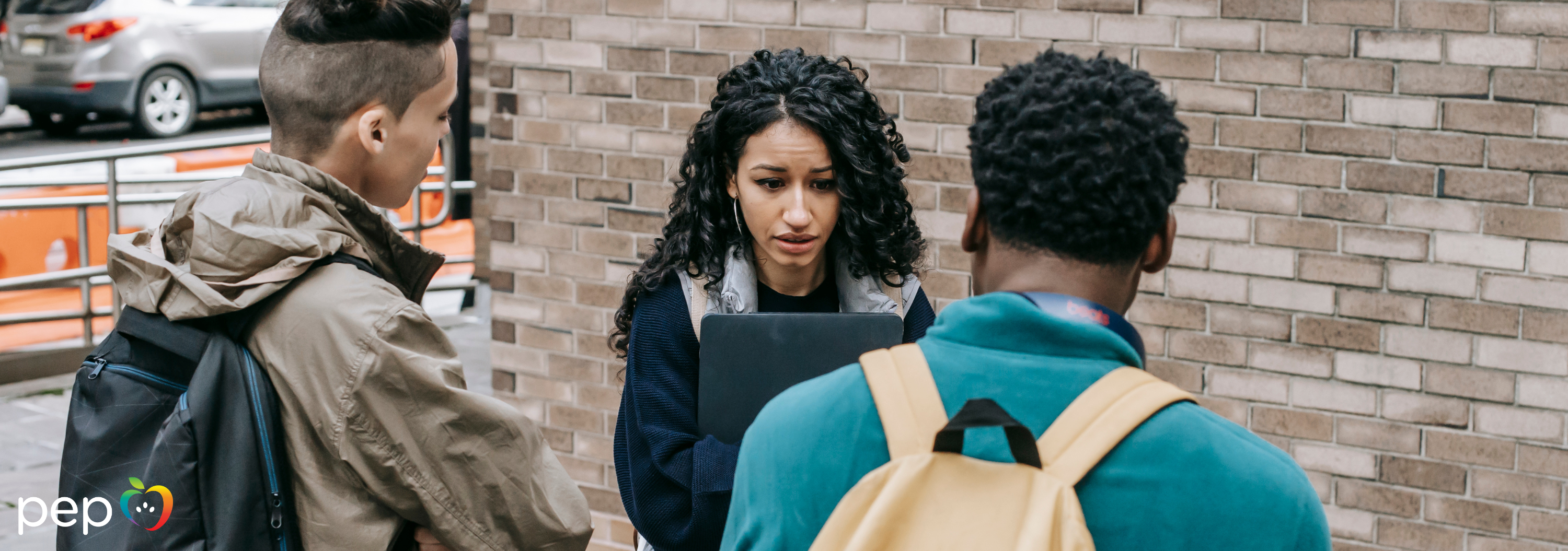Supporting Young People Experiencing Back-to-School Anxiety
Before the 2023-2024 school year ended, we talked to four PEP Hopewell middle and high school students about summer vacation and the inevitable back-to-school anxiety that would occur in the fall. They had a message for the adults in their lives: school is really hard. Sometimes overwhelmingly so. It’s not just the school work, either. It’s the peer dynamics, the expectations from adults and the day-to-day stress of their routines. The students wanted their parents and teachers to know that sometimes it felt unmanageable.
As adults, it can be easy to reflect on our own childhood and its related childhood responsibilities and minimize the stress our school-aged students feel. We know we didn’t have to think about paying a mortgage or making rent. We didn’t have to care for anyone but ourselves. Compared to keeping a roof over your family’s head, raising children and striving for professional success, school work seems like it would be a breeze. To our young people, though, school and its related responsibilities impact every aspect of their life – from educational to vocational to social.
What’s on our Young People’s Minds?
Not surprisingly, the students with whom we spoke universally loved summer break. With its slow pace and diminished responsibilities, kids get a break from stress and spend more time doing the things they want to do, rather than the things they are told to do. Thinking about back-to-school caused mixed emotions for the PEP Hopewell students. While there was some excitement about showing off a new outfit and seeing their friends again, the kids also acknowledged feeling anxious and even mad about having to return to the classroom.
“I get nervous about what teacher I will have and if they will be nice or mean,” said one student. “It’s the other kids I worry about most,” added another. “Will I make friends or will they make judgments about me?” Another common stressor was academics. Students were concerned about how much they might have forgotten over the summer and worried about whether they could keep up in the next grade. “It’s just a lot of work and I don’t think grownups get that,” one of the high schoolers explained.
Kids POV: How Adults Can Be Supportive During Back-to-School
The PEP Hopewell students made suggestions about how adults might support young people if they experience back-to-school anxiety, including:
- Acknowledging and validating their feelings of stress.
- Ensuring that they can participate in activities they enjoy outside of school like sports or music.
- Allowing them to engage in calming activities such as drawing or origami when they feel overwhelmed.
- Working on in-the-moment stress-reduction strategies like breathing exercises so they know what to do when they feel overwhelmed.
- Understanding that from time to time, they may need time away. It may be a brief break out of the classroom or a mental health day at home.
Clinical POV: How Caregivers Can Help Ease Back-to-School Stress
PEP Hopewell Clinical Associate Kim Corrado also had some suggestions for caregivers that could help ease the stress of the back-to-school transition.
- A week or two before school starts, resume school year routines such as bedtimes and picking out clothes for the next day.
- Arrange get togethers for young people with familiar peers. The presence of a familiar peer during school transitions can improve academic and emotional adjustment.
- Visit the school before the school year starts. Have the young person practice drop off and walking into the classroom if the building is open.
- Come up with a reward the child can earn for separating from mom and dad to go to school.
When It’s More Than Just Jitters
For most kids, back-to-school jitters are just that. Jitters. For others, returning to the classroom causes more serious anxiety. Corrado says when the anxiety about going to school starts to impact other parts of a young person’s day, it’s a red flag that something more serious may be going on. “If the child won’t eat with the family, or he won’t get out of bed; if it’s Friday night and his whole weekend is ruined from dwelling on going back to school; if you’re seeing psychosomatic complaints, it’s time to consider getting some help,” she explained.
For families whose young person attends a PEP Day Treatment Center, there are several options if you are seeing these red flags and suspect it is related to back-to-school anxiety. Get connected with OhioRISE, a Medicaid program in Ohio designed to help young people with significant mental health issues succeed in their schools, homes and communities. PEP is the “Care Management Entity” for central Cuyahoga County and coordinates services for young people in this region. Reach out to your child’s Day Treatment Center to be connected with its community-based care manager, who can provide your family additional support. And finally, connect with the classroom staff at your child’s center to work collaboratively on ways to ease the transition for your young person.
Learn More
For more information about PEP’s Day Treatment Centers, visit our website. Contact Nicole Molnar, sr. director, clinical services, at 216-361-7760 ext. 110 or via email to see if a student in your district may be a good fit for Positive Education Program.
Please note, referrals to PEP’s Day Treatment Centers are made through school districts in consultation with parents. Interested parents or caregivers should contact their school administrator.
